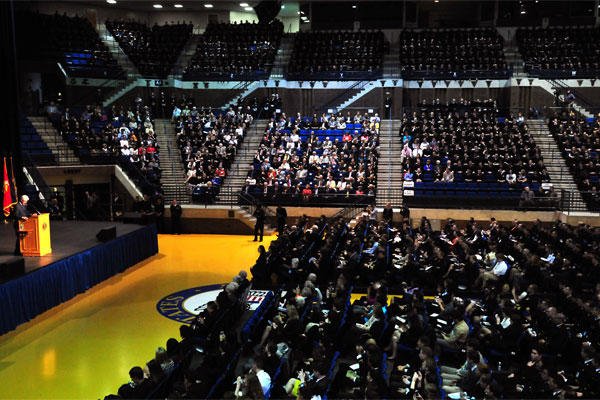ANNAPOLIS, Md. -- Former President William J. Clinton delivered remarks to the Brigade of Midshipmen, staff, faculty and guests at the Naval Academy, April 8, as a part of the 54th Annual Naval Academy Foreign Affairs Conference (NAFAC).
Clinton, the 42nd President of the United States, immediately endeared himself to the Midshipmen in attendance by granting them all a weekend of overnight liberty at the beginning of his Forrestal lecture.
The Forrestal Lecture Series was established at the Naval Academy in 1970 in honor of the late James V. Forrestal, a former Secretary of the Navy who was instrumental in the development of the modern Navy.
Clinton's remarks were focused on the leadership challenges facing the Navy, Marine Corps and the nation in the age of interdependence on information technology. The theme of NAFAC this year is "Human Security in the Information Age." President Clinton talked about the challenges of leadership in the information age and in an interdependent environment.
"You have to find a way to build the positives and reduce the negatives of our interdependence," said Clinton. "I predict for the next 40 years, the conflicts will involve an attempt to define the terms of our interdependence."
Clinton discussed the evolution of world events and how they have played out in the information age, noting that the 2004 Sumatra tsunami was the first "internet disaster," which resulted in millions of dollars in aid being pledged for relief. Further, Clinton noted that the 2010 Haiti earthquake marked a shift in the dynamic of relief donations because people could pledge donations from their smart phones.
Clinton warned the audience that the current information environment is also full of potential peril. Political, criminal, and violent threats made possible by the information age not only threaten individual security also undermine the ability of states to protect its citizens.
"This technology empowers the forces of destruction," said Clinton.
Clinton ended his lecture in the same way he started, by discussing the importance of leadership during these uncertain times in the information age.
Clinton discussed the importance of the leadership legacy left by Adm. Elmo Zumwalt, a former Chief of Naval Operations, to whom Clinton awarded the Presidential Medal of Freedom. President Clinton eulogized Adm. Zumwalt after his death in 2000, and referred to Zumwalt as the "Conscience of the Navy."
"There is only one word on his (Zumwalt's) gravestone - Reformer," said Clinton as he addressed the midshipmen about the topic of reforming leadership. "I ask you to remember the theme of reforming. The future of the U.S. rests in no small measure on our ability to reform our most cherished institutions."
"We can always do better. We can always reform," said Clinton.
In closing, Clinton urged the audience to understand and appreciate the similarities between people and leaders in the world, rather than the differences as we reform leadership and meet the challenges of the information age.
"If you are trying to think about how the Navy and Marine Corps can be adjusted to meet the demands of the 21st century, it is well to remember that we have to share that future," said Clinton. "We have to create a climate of sufficient trust and sufficient coordination so that we can pay sufficient attention to what we have in common."





























